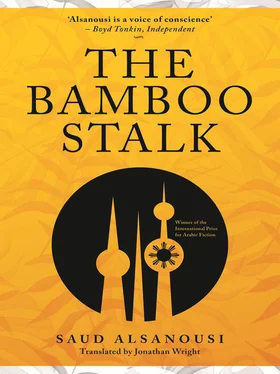I didn’t understand what Ghassan said about Nouriya’s attitude. Why was she so upset? What was it that threatened her reputation and made her the laughing stock of her husband’s family? Why did my presence complicate marriage for her son and her daughter? Those were the same words Grandmother had said to my father years earlier when she found out my mother was pregnant: ‘And your sisters, you selfish, despicable man. Who’ll marry them after what you’ve done with the maid?’ These were things I didn’t understand. When I was in the Philippines my mother couldn’t explain them to me. I asked Ghassan what it all meant.
‘It’s impossible to explain such things to you, Isa,’ he replied, ‘and it’s hard for you to understand.’ I was in a difficult position, caught between support from Khawla and Awatif, and categorical rejection by Nouriya.
Hind was unsure where she stood. She was a rights activist, well-known as Hind al-Tarouf. ‘My credibility is on the line and so is my name,’ she had said. She would have to sacrifice one of them — either her credibility or her name. If she upheld my rights as a human being when people found out that her war hero brother, Rashid al-Tarouf, had married a Filipina maid, she would have to sacrifice the way people saw her illustrious name. Sacrificing her principles and taking a stand against my human rights would preserve the prestige of her name and society’s respect for her. Or she could try to preserve both her own reputation as a person of principle and the reputation of her family by sacrificing me before anyone found out about me. But would it be any sacrifice on their part if they disowned me and turned me away? If that was the case, I would have been happy, because choosing to sacrifice me would mean that I had some value in their eyes. Real sacrifice means giving up things we value, something irreplaceable, for the sake of something else. But as far as I knew I had no value. They didn’t need me. If I disappeared it would be no loss to them, and they wouldn’t need anything to make up for my disappearance.
‘And my grandmother, Ghassan, my grandmother, what did she think?’ I asked, after he had briefed me on the conversation I couldn’t understand when I was with them. He blew out some cigarette smoke and said, ‘Auntie Ghanima has the first say, and the last say.’ Then he paused to think.
I looked at his face with interest. ‘And what did she decide?’ I asked.
‘Did you hear her say anything at the meeting?’ he asked.
‘No, she was silent, just looking at people’s faces all the time,’ I replied.
He stubbed his cigarette out in the ashtray and looked at me. ‘Why ask me now what she thinks? Maybe she needs some time to think,’ he said.
He paused, and smiled to reassure me. ‘Leave things to Khawla,’ he added.
* * *
There were many things my mother hadn’t told me about the paradise I was promised. She told me a lot about making dreams come true, securing a safe future and many opportunities that weren’t available to anyone in the Philippines. For years I had lived on Mendoza’s land listening to what my mother had to say: ‘One day you’ll go back to your father’s country.’ Yet when I did go back to my father’s country I found that I posed a dilemma for his family. They wanted me but didn’t want me. Some of them were happy I’d come back. Others were undecided and others wanted to pay me off and ask me to go back to the Philippines. In the meantime I was in a country I didn’t know, looking for somewhere that would take me in, torn between Kuwait and the Philippines.
As soon as I learned to live with my new name, Isa al-Tarouf, and shook off my old names and nicknames — José, ‘the Arabo’ and ‘the bastard’ — I found there were people who were offended that I shared their name. I’m not Mendoza, who didn’t have a father. I’m Isa, and I have a father called Rashid al-Tarouf.
9
Three days after the family meeting I was in Ghassan’s flat feeling cold, though the weather was mild as far as he was concerned. I was wrapping my hands around a cup of coffee, toasting my feet in thick socks against an electric fire and watching one of the foreign film channels. Ghassan was reading a book. His mobile phone rang. He put the book upside down on his knees and looked at the screen of his phone. ‘It’s a call from your family,’ he said.
In a single leap I was on the sofa where he was sitting. ‘My mother? Or Mama Aida?’ I asked impatiently.
He didn’t answer. He put the phone to his ear and said, ‘ Wa aleekum as-salam .’ The conversation went on for more than ten minutes, and throughout it Ghassan didn’t say a single word. He just nodded and murmured ‘Mmm’ every now and then. Then the conversation ended.
‘Listen, Isa,’ he said. ‘You’re going to go and live in your grandmother’s house.’
As soon as he said the words I couldn’t help jumping up and down in the middle of the sitting room, punching my fists in the air and shouting, ‘Yes, yes, yes!’ I felt that the ground was shaking under my feet.
‘Isa!’ Ghassan said in annoyance. ‘Stop jumping. We’re on the fourth floor and there are people beneath us.’
I went back to the sofa where he was sitting and looked straight into his eyes. ‘Beneath us?’ I asked. ‘But we’re the lowest of the low, you and me,’ I said, shaking my head.
Ghassan laughed so much that he was shaking all over. ‘I’ll miss you, you crazy,’ he said.
Jabriya is not far from Qortuba, where my grandmother lived. But I suddenly felt sorry for Ghassan, though he had lived alone all his life. I felt that by moving to my grandmother’s house I was abandoning him. I remembered my father and Walid and when they were with Ghassan and my mother’s stories about the three friends — their private world, their conversations, their singing, their travels abroad and their boating trips. The man must feel very lonely in his small, claustrophobic flat in a building full of a mixture of migrant workers — Egyptians, Syrians, Indians and Pakistanis.
‘Ghassan,’ I said.
He stopped laughing and looked at me.
‘Why haven’t you got married yet?’ I asked.
His face reverted to the face of the Ghassan I knew. He took the book off his knees and put it on the sofa beside him. He was about to say something but he stopped. I picked up his packet of cigarettes, took one out, lit it and offered it to him.
‘Go on, spit it out with the cigarette smoke,’ I said.
He took a deep puff. The end of the cigarette glowed bright red and bits of ash fell off. ‘I don’t want to have children who would curse me after I die, Isa,’ he said as he exhaled the smoke. He leaned back in the sofa and locked his hands behind his head, with the cigarette hanging on his lip. ‘All I could pass on to my children would be a label that has stuck to me all my life,’ he continued, then stopped and looked at me. ‘Being a bidoon, Isa,’ he said, ‘is like having a damaged gene. Some genes malfunction but are not passed on, or they only recur in later generations. But this malignant gene never misses. It passes from one generation to the next without fail, destroying the hopes of those who carry it.’
Ghassan stubbed out his cigarette in the ashtray, then withdrew to his room.
* * *
While I was in the sitting room late that night, Ghassan came out of his room with his face swollen and his eyes half-shut. He passed me his mobile. ‘A call from. .’ he said, opening his mouth wide in a big yawn, ‘your sister Khawla.’ I took the phone. Ghassan turned and walked robotically back to his room.
‘Hello.’
‘Hi, Isa. I hope I haven’t woken you up.’
‘No, no. I hadn’t gone to sleep yet.’
Читать дальше












